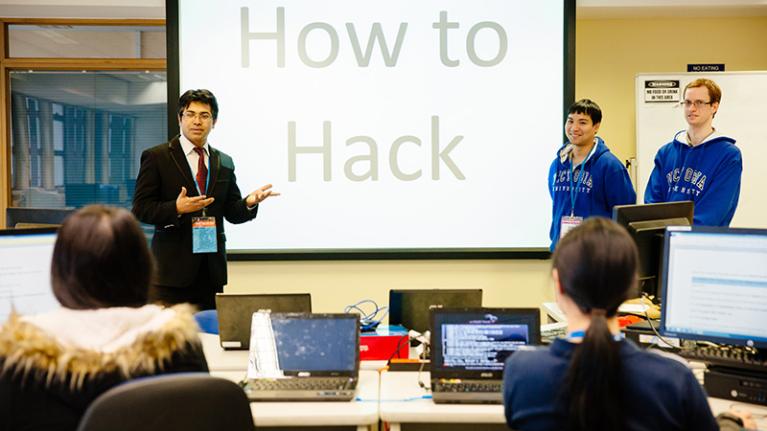Overview
Gain in-demand computing skills and invaluable work experience with VU's Bachelor of Information Technology (Professional).
Our IT (professional) degree gives you a solid foundation in the latest web and mobile app development, and network and systems design. You'll also have the exciting opportunity to experience 12 months of guaranteed internship in the IT industry as part of your degree.
VU's computer-science courses are among the best in Australia according to the 2018 Times Higher Education World University Subject Rankings 2018. Our state-of-the-art classrooms and facilities offer virtual and hands-on teaching.
You will build your computer-science knowledge through solving real-world problems in:
- web development
- mobile-application development
- data analysis
- cyber security
- network and system computing
- ICT management
- software engineering and development
- network management
- global leadership.
You'll also gain the experience needed to lead teams and manage projects.
Real-world experience
High-achieving students in VU's Bachelor of Information Technology will be eligible to transfer into this course to take part in a 12-month guaranteed IT internship.
The real-world work experience gained alongside qualified IT professionals will be of huge benefit in your job applications following graduation.
Accreditation & industry certification
This course is accredited by the Australian Computer Society.
It also helps you to prepare for the following:
- CISCO/Microsoft industry certifications
- Apple app development
- Content Management System (CMS) development and management.
Learning advice
VU’s Learning Hubs are welcoming spaces where you can improve your study and employability skills.
Our students can attend Learning Hubs at one of five VU campuses.
We offer maths, writing, careers and English-language advice, and show you effective ways to study and manage your time.
Our programs include:
- workshops
- drop-in sessions
- peer mentoring
- maths and writing resources
- resume and career guidance.
We also have accessibility support services and counselling services available for all students.
Women in IT & computer science
Our Women in Science & Engineering program supports our current university students, and inspires women to choose engineering and science careers.
Study overseas while earning course credits
At VU you can spend part of your degree studying overseas all while gaining credits towards your course.
Immerse yourself in a new culture and learn from a new perspective, while building experiences that will help you to stand out in the competitive job market.

In addition to our undergrad and postgrad courses, we also have strong partnerships with leading companies in the industry. These include but not limited to AWS, Cisco, Microsoft and Oracle. Victoria University is an academy for a multitude of certification courses from these leading industries. This means, as our students, you will have the opportunity to study certification courses taught by seasoned lecturers and research academics within the IT discipline with discounted certification examination fees. For more details, please visit the following links and contact your course chair.
- Amazon - AWS Training & Certification
- Cisco - Cisco Networking Academy
- Microsoft - Microsoft Education
- Oracle - Oracle Academy

Learn from experts in the field, in a supportive IT environment.
Careers in IT and computer science
Australia's information and communications technology (ICT) industry is a dynamic and rapidly growing market.
VU's Bachelor of Information Technology (Professional) gives you the real-world work experience to prepare for roles in:
- network design and implementation
- system security consultancy
- data modelling and database development
- web and mobile application programming
- network and database system administration
- information and communication technology (ICT) management.
Job titles
- software analyst
- web designer
- web application developer
- mobile application developer
- computer and network support
- data centre administrator
- systems administrator
- system security consultant
- database administrator
- webmaster
- business analyst
- data analyst
- project manager (e.g. in government, banking/finance, retail, manufacturing).
Salaries
Use Labour Market Insights to find average annual salaries and employment growth predictions for various ICT professions in Australia:
Course structure
To attain the Bachelor of Information Technology (Professional) students will be required to complete 336 credit points consisting of:
- 96 credit points of First Year Core studies;
48 credit points of Graduating Core studies;
96 credit points of Major studies;
- 2 x 48 credit points of Industry Placement studies.
Course structure and units
First Year Core Units
-
- Unit code
- NIT1101
- Credits
- 12
-
- Unit code
- NIT1102
- Credits
- 12
-
- Unit code
- NIT1103
- Credits
- 12
-
- Unit code
- NIT1104
- Credits
- 12
-
- Unit code
- NIT1201
- Credits
- 12
-
- Unit code
- NIT1202
- Credits
- 12
-
- Unit code
- NIT1203
- Credits
- 12
-
- Unit code
- NIT1204
- Credits
- 12
Industry Placement Units
-
- Unit code
- NIT3001
- Credits
- 48
-
- Unit code
- NIT3002
- Credits
- 48
Compulsory Minors
-
- Unit code
- NMIITC
Majors
-
- Unit code
- NMAWMD
-
- Unit code
- NMANSC
Achieve more with the VU Block Model
We are the first Australian university to use a 'block' model of learning, where you study one unit at a time rather than juggling several at once.
Introduced in 2018, the VU Block Model has improved our student results and achievements, and has won awards for innovation and excellence. Initially for first-year students, it now applies to all students studying at our Melbourne campuses.
You'll study in short bursts, called blocks, of three 2-3 hour face-to-face teaching sessions per week.
Each block focuses on one unit (subject) and is only four weeks long, with up to four days between. Our two semesters have four blocks each, and there are optional blocks over winter and summer where you can catch up on a missed unit.
Some courses have labs and pracs too, and these are generally scheduled on the same days as teaching sessions. There are also workshops where you'll develop your study skills and prepare for your future career.
Find out more about the VU Block Model.
Learning outcomes
On successful completion of this course, students will be able to:
| 1. | Integrate and investigate a broad and coherent body of knowledge of information technologies with depth in selected areas of study from the following areas: networking, security, virtualisation, enterprise network management, cloud, data analytics, ICT management, web application development, mobile application development and database; | ||
| 2. | Analyse and adapt the latest information technologies with intellectual independence, self-learning capabilities and creativity to identify and solve real-world problems with sound decisions and judgement in a broad range of sectors including ICT, government, banking and finance, retail, education, health, media and manufacturing; | ||
| 3. | Exhibit a range of technical, analytical, managerial, leadership and interpersonal skills; in-depth understanding of the codes of ethics and conducts of IT professions; capacity to perform IT design and development practice in an independent or collaborative environment with a strong industry focus; and the responsibility and accountability in professional practice and as a lifelong learner; | ||
| 4. | Present solid foundation and strong practical skills with the ability of life-long learning for industry certifications from large reputable vendors both locally and overseas, such as CISCO Certified Network Associate (CCNA) and Microsoft Certified Technology Specialist (MCTS). |
What's a unit?
A unit or 'subject' is the actual class you'll attend in the process of completing a course.
Most courses have a mixture of compulsory 'core' units that you need to take and optional elective units that you can choose to take based on your area of interest, expertise or experience.
Credits
Each unit is worth a set amount of study credits based on the amount of time you study. Generally, 1 credit is equal to 1 hour of study per week.
Admissions
Victoria University is committed to providing a transparent admissions process. Find out more about how to apply for our courses, and our commitment to admissions transparency.
Applicants for this course will need to have met the academic requirements and prerequisites for this course outlined below.
Meeting the minimum admission criteria does not guarantee entry into this course. Past academic performance may be considered.
Entry requirements
Completion of an Australian Senior Secondary Certificate (VCE or equivalent) including Units 3 and 4: a study score of at least 25 in English (EAL) or 20 in any other English (or equivalent).
PLUS:
A study score of at least 20 in Mathematics (any).
OR:
Completion of an Australian Advanced Diploma or Diploma (or equivalent).
PLUS:
IELTS (or equivalent): Overall score 6.0 or above (with no band less than 6.0 in Listening, Reading, Writing and Speaking).
OR:
Completion of a Foundation course or equivalent.
Find out if you meet the entry requirements, including English language and academic requirements.
Pathways & credits
There are many ways you can start your education journey at VU. Pathways offer an easy transition between courses at different levels, so that you can start with a certificate and progress right through to postgraduate study.
Pathways from VU courses
If you have completed any of the following course(s), you will be guaranteed a place in this course. In some cases you may receive credit for your previous study, reducing the time it takes to complete your course.
You will be credited for up to 96 credit points of study.
Find out more about pathways and credits.
Credit for skills and past study
Use our credit calculator to find out how much credit you could get towards your course, based on your previous study.
If you have completed study with another university or institution and believe you are eligible to receive credit for skills and past study, you can apply for advanced standing.
Applications for advanced standing can be made after a discussion with your course chair or academic adviser.
How to apply
We are currently accepting international applications, and we welcome you to apply for this course.
Click 'apply' to begin, and we will guide you through the application process.
If you have questions, please get in touch:
- Phone: +61 3 9919 1164
- Online: enquiry form
Information and fees listed above are for non-resident students. Fees are accurate at the time of viewing and will be subject to annual increases. Some courses require students to purchase equipment or clothing that they will need in the course. These equipment or clothing costs are not included in the course fees listed above – check your Letter of Offer for an estimate on non-tuition-fee-related expenses.
VU takes care to ensure the accuracy of this course information, but reserves the right to change or withdraw courses offered at any time. Please check that course information is current with the Student Contact Centre.



